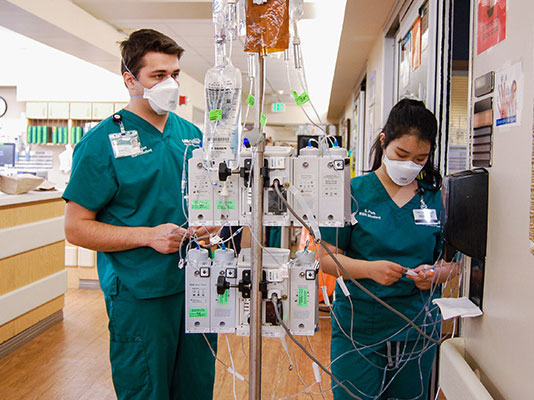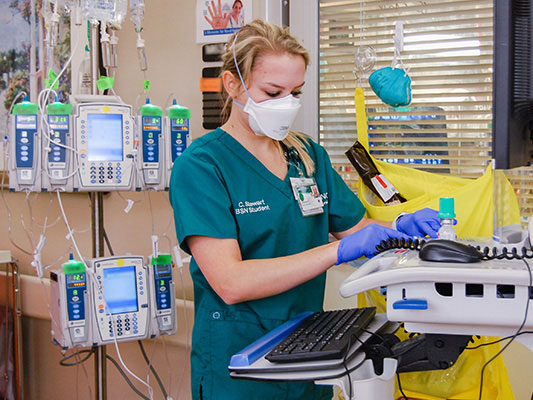
By Pareasa Rahimi
Collaboration among the University of Alabama at Birmingham School of Nursing, Nursing Services at UAB Medicine and the Alabama Board of Nursing in response to the COVID-19 pandemic has contributed to the development of new regulations designed to help ease nursing workforce shortages, address increased patient volumes, demanding clinical care needs and provide educational opportunities for students.
A new case study co-authored by leaders of UAB School of Nursing, UAB Medicine and the Alabama Board of Nursing, “Innovations in Academic/Clinical Partnerships During COVID-19 to Prepare a Ready Nursing Workforce,” and published in the April 2023 issue of the Journal of Nursing Regulation, details the UAB Nursing Partnership’s nursing student aide initiative and the critical role the ABN played in implementing regulatory changes to help ensure the pilot program would continue long after the pandemic ended.
During the height of the COVID-19 surges, the UAB School of Nursing and UAB Medicine developed an innovative approach using the School’s faculty and students to assist with patient care in critical need areas and to administer COVID-19 vaccines. The initiative provided needed workforce relief for bedside nurses and clinical learning experiences for students at a time when many nursing schools across the country had to put clinical learning experiences on hold.
“The COVID-19 pandemic put great demands on the workforce needed to care for ill patients and to prevent illness from occurring. That was the top priority, but it was also critical to continue providing hands-on learning experiences for our nursing students to get them to graduation and into the workforce,” said Associate Professor and Interim Associate Dean for Clinical and Global Partnerships Michele Talley, PhD, CRNP, ACNP-BC, FAANP, FNAP, FAAN (MSN 2005, PhD 2015).
The students were employed by Nursing Services as nursing student aides and were supervised by the School’s faculty and UAB Medicine nurses. The pilot was so successful in addressing critical workforce concerns and ensuring quality care—while also exploring new teaching models to ease the transition to practice—that the group worked closely with the ABN to implement and expand the application of its nursing student aide regulations within the UAB system. The regulations were then expanded beyond UAB and can now positively impact other health care organizations and nursing students in Alabama.
“We are pleased with the success that UAB has enjoyed in implementing the student nurse/graduate aide program and the positive impact it has had throughout the state,” said Executive Officer of Alabama Board of Nursing Peggy Sellers Benson, MSN, RN, MSHA, NE-BC.

The ABN-expanded nursing student aide role allows graduated students who had not yet passed the NCLEX to remain in the role pending licensure. Additionally, in spring 2021, to support expanded student scope of practice, the ABN released just-in-time trainings to educate nurses, nursing students and the public on the scope of practice of nursing student/graduate aides. These rules, which remain in place for less formal student nurse/graduate aide arrangements, formed the foundation for the ultimate development of the Student Nurse Apprenticeship rules, which became effective March 17, 2022.
“While the pandemic presented many challenges to the nursing workforce, it also allowed us to test new models designed to produce a practice-ready workforce,” Talley said. “Our deliberate discussions, planning and implementation shaped the Student Nurse Apprenticeship Program. These initiatives eased transition to practice for nurses entering the workforce while lessening the existing high demands for the current workforce.”
“The Student Nurse Apprenticeship Program is essential to the future of health care and nursing in Alabama, and we are already seeing its effects in passage rates on the national licensure exam and the quality of nursing care in our state,” Benson said.
The new regulations have allowed for enhanced care delivery for patients and families and have alleviated pressure on nurses and other health professionals at UAB Medicine. It also has allowed the School to build on student competencies to increase their confidence in caring for patients once they become registered nurses.
“The positive impact of these regulations has given us an earlier opportunity to connect with nursing students in the environment where they will care for patients, allowing them to be part of the nursing team and ultimately transition into practice as registered nurses with a little more confidence and a greater sense of belonging,” UAB Medicine Associate Vice President of Nursing Quality and Clinical Effectiveness Jill Stewart, DNP, RN, CNOR, LSSGB (MSN 2005, DNP 2010) said.
Co-authors of the publication include Talley, Stewart and Benson; Associate Professor and Interim Associate Dean for Technology and Innovation Penni Watts, PhD, RN, CHSE-A, FSSH, FAAN (PhD 2015); Assistant Professor Jennie Alspach, DNP, RN, FNP-BC (BSN 1996, MSN 1999, DNP 2020); UAB Medicine Chief Nursing Officer Terri L. Poe, DNP, RN, NE-BC (BSN 1986, DNP 2013); Professor and Senior Associate Dean for Academic Affairs Linda Moneyham, PhD, RN, FAAN; Dean and Fay B. Ireland Endowed Chair in Nursing Maria R. Shirey, PhD, MBA, MS, RN, NEA-BC, ANEF, FACHE, FNAP, FAAN; and retired Dean and Fay B. Ireland Endowed Chair Doreen C. Harper, PhD, RN, FAAN.